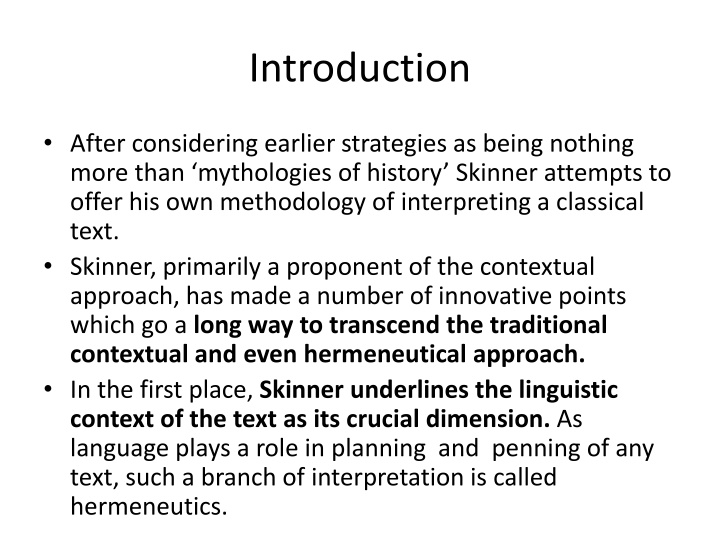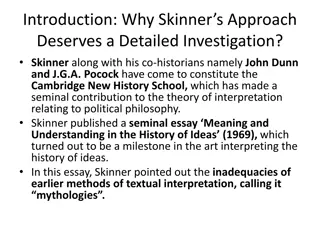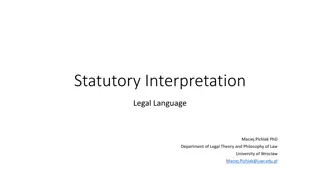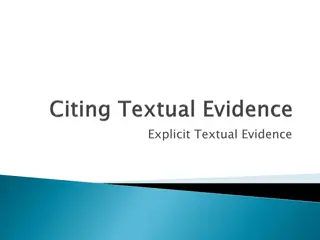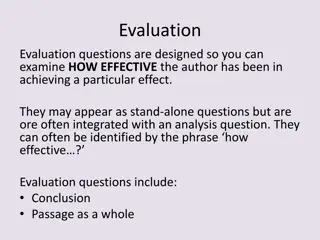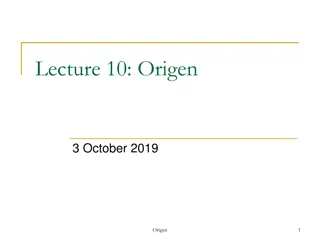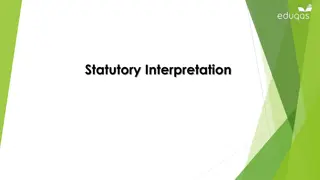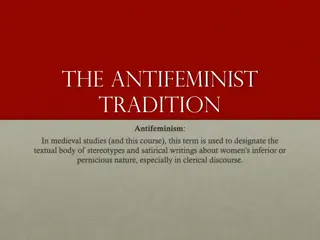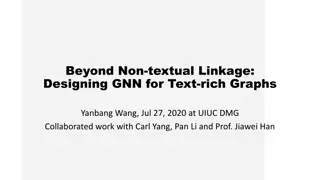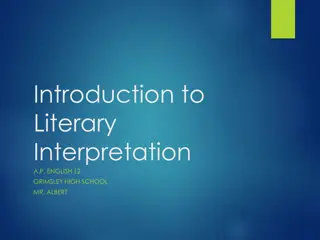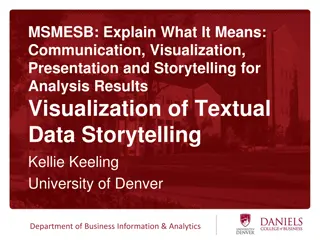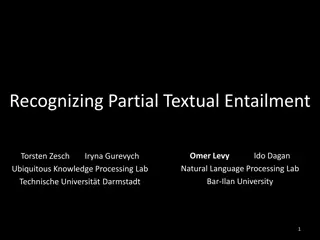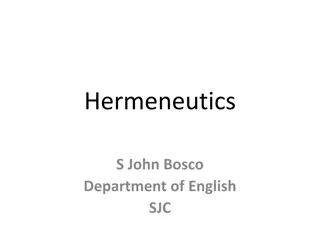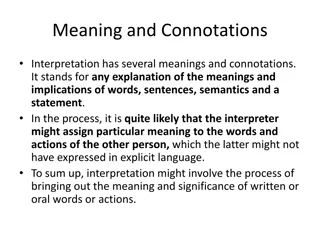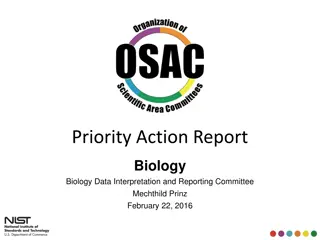Skinner's Innovative Approach to Textual Interpretation
Skinner's methodology in interpreting classical texts involves a focus on linguistic context, utilizing hermeneutics to uncover deeper meanings. Departing from traditional views, he emphasizes the importance of language and speech-act theory in understanding authorial intentions within broader social and linguistic contexts.
Download Presentation

Please find below an Image/Link to download the presentation.
The content on the website is provided AS IS for your information and personal use only. It may not be sold, licensed, or shared on other websites without obtaining consent from the author.If you encounter any issues during the download, it is possible that the publisher has removed the file from their server.
You are allowed to download the files provided on this website for personal or commercial use, subject to the condition that they are used lawfully. All files are the property of their respective owners.
The content on the website is provided AS IS for your information and personal use only. It may not be sold, licensed, or shared on other websites without obtaining consent from the author.
E N D
Presentation Transcript
Introduction After considering earlier strategies as being nothing more than mythologies of history Skinner attempts to offer his own methodology of interpreting a classical text. Skinner, primarily a proponent of the contextual approach, has made a number of innovative points which go a long way to transcend the traditional contextual and even hermeneutical approach. In the first place, Skinner underlines the linguistic context of the text as its crucial dimension. As language plays a role in planning and penning of any text, such a branch of interpretation is called hermeneutics.
Skinners Methodology: Use of Hermeneutics Traditionally, hermeneutics was being used in the case of exegesis-critical interpretation of the religious texts. It was believed that the real challenge was to find the authorial intention in a given text which could be retrieved by purging all subjective factors on the part of the interpreter. It was further believed that the real intention of the author is fixed and specific which could be retrieved only by purging all subjective factors.
Ontological Hermeneutics Subsequently, as against such traditional view of hermeneutics, Heidegger, Habermas and Gadamer put forward their own views which came to be known as the theory of ontological hermeneutics. Basically, they underlined the centrality of language used in a given text as being of central importance. Skinner also believes that the language of the text could be viewed and analyzed to bring out its real meaning and significance. He argues that even the authorial intention is objectified in the form of the language of a given text. But language has its spatio-temporal context. Hence, the language of the text would have to be analyzed in its broader linguistic and social context.
Skinners Use of Speech-act Theory Skinner also favours the use of speech-act theory as developed by scholars like Austin and others The plain meaning of speech-act theory is that there is an intimate connection between speech and action. In speaking and writing, language is used in two senses: locutionary and illocutionary. When an utterance is taken in terms of its intrinsic meaning, it is called locutionary use of the language. But when an utterance is taken in the context of its functional use, it could be described as being illocutionary.
Skinners Use of(Cont.) For example, the father tells his son, the weather outside is stormy . He could mean two things: i. He is just making a simple statement; or ii. He could be warning the son not to go out of the house. The first is the locutionary, whereas the second is the illocutionary use of the language. Skinner favours the use of both locutionary and illocutionary meanings of the language into the process of interpreting any given text. Skinner illustrates his point by referring to Machiavelli s advice to the Prince not to be virtuous.
Skinners Use of(Cont.) There are two ways to look at his advice. One way is to locate the locutionary meaning of his advice. In the time of Machiavelli, the Prince was being advised to be virtuous by most of the thinkers and writers. Hence the real purport of his advice to the Prince not to be virtuous marks his departure as well as his originality. Skinner calls such departure as the manipulation of convention of the available ideologies.
Illocutionary Meaning However, a second way to approach Machiavelli s advice is to look at its illocutionary meaning- what he was trying to do by manipulating available ideological conventions. This is a part of his practical political maneuvering. This way the text is put in the context of the real problematique of its time. Practical/political context of the text Prince is provided by: a) the collapse of Florentine republic in 1512; and b) the fact of the prevailing disunity among northern Italian states.
Illocutionary Meaning(Cont.) Besides, there was the threat emanating from the presence of big French and Spanish armies around the area. However, Machiavelli could pin his hope in the presence of a strong Medici Prince in Florence and also a Medici Pope in Rome. But to face such a challenging task, the Prince had to discard some of the conventional virtues. Hence, he advised the Prince not to be virtuous. In the process, Machiavelli was achieving two major objectives: manipulation of existing conventions as well as to justify some unconventional political action. Thus, Skinner believes that changing the ideological conventions also amounts to changing the way of political action.
Skinners Conclusions Skinner concludes from the above discussion that one cannot have an adequate understanding of a given text, if it is taken as self-sufficient object of an enquiry. In fact, such singular reliance on the text would not only be inadequate but might yield positively misleading results. This is so for two reasons: i. One, meanings of the terms used by the writers keep on changing over time.
Skinners Conclusions(Cont.) ii. Two, quite often the writer might have used her/his words as rhetorics or ironies and as such what s/he said and what s/he actually meant might be entirely different. Skinner further argues that deciphering the mere meaning of a doctrinal/canonical statement by a classical author is just one part of the hermeneutical task. More importantly we have to understand the intended force with which the statement was made. In other words, one has to grasp not only what is being said, but also what the author is doing in saying so .
Skinner and Lovejoys Unit Idea Concept Lovejoy (1960) has projected the unit idea concept . The plain meaning of unit idea project is to pick up a single idea and track it down over the centuries covering many thinkers and their ideas. For instance, one could pick up any classical ideas like justice , social contract , progress , equality , etc., and track them over the centuries to see how any of them has developed over the centuries. Skinner finds two basic problems with such an approach: i. One, we cannot understand a single idea even within a given culture, let alone in different cultures. This is so because it could be used with varying and incompatible intention .
Skinner and Lovejoys(Cont.) For instance, the idea of nobility could be used in the sense of nobility of birth or behaviour or even to indicate the ignoble behaviour of the nobles . Therefore, a simple understanding of the context of the utterance might not serve our purpose. In fact, one has to understand various contexts in which the given idea has been used. Besides, one has to know its various actual or potential functions. Skinner faults Lovejoy s unit idea theory on the basis that he (Lovejoy) tended to assume that there could be any such constant essential meaning to any single idea.
Skinner and Lovejoys(Cont.) ii. The second problem with unit idea theory it makes one lose live contacts with the individual thinker. What role did the idea play in one s thought process; what questions was s/he trying to answer with those ideas; and why did the same idea continue to be used in the subsequent times are some of the questions which could not be answered by employing unit idea system. On the basis of the above discussion Skinner s two major conclusions are summed up here: a) The first relates to finding an appropriate method for studying the history of ideas. On this point he comes to the basic conclusion that for an adequate understanding of a given text, we have to grasp two things:
Skinner and Lovejoys(Cont.) i. ii. What the author intended it to mean; and How that meaning was intended to be taken. Hence, in the process of studying a text, one has to take into account the targeted audience as well as the intended meaning to be addressed to them. As the next step, one has to proceed to trace the relationship between the given utterance and their wider linguistic context so as to decode its intended meaning and the authorial intentions. Once we set such goal, a deeper and wider study of the social context becomes inevitable. It will help us to decide what conventionally recognizable meaning might have been intended by the author to be communicated.
Skinner and Lovejoys(Cont.) Thus, social context might work as the final court of appeal in the process of locating at the plausible authorial intentionality from among contending ascriptions. b) Skinner s second conclusion is that there is no case for classical texts providing the answer to perennial problems . The implication here is clear that classical texts are concerned with their problems and not with ours. In fact, he goes to the extent of saying that there are no perennial problems in philosophy. Hence, we have to engage in our own thinking instead of looking for directly applicable lessons from the history of philosophy.
Skinner and Lovejoys(Cont.) But Skinner does not mean that the study of the history of ideas has no philosophical value. Rather, there is an exciting possibility of a dialogue between philosophical analysis and historical evidence . Thus, classical texts still have their relevance and philosophical significance, even though they were concerned with their own problems and not ours. They can help us in revealing varieties of viable moral assumptions and political commitments. And that is where lie their philosophical and moral values.
Concluding Observations It is to be noted with all sincerity that Skinner s views and method of interpreting a classical text has earned wide and high appreciation. Nevertheless, Skinner s method has also been subjected to criticisms. Kenneth Minogue has argued that Skinner s approach could not be successfully applied to the study of all social sciences. For instance, a political idea might stand on its own and need not have to perennially relate to its context. A second line of criticism has come from Terence Ball who has his own considered views on the subject. According to Ball Skinner has given undue importance to the fact of authorial intention.
Concluding Observations(Cont.) Terence Ball does not completely rule out the significance of recovering the authorial intention. But he is not in favour of attaching undue importance to it. Ball further argues that irrespective of authorial intention, a text has a life of its own. Thus, the consequences flowing from the text might be of a different nature from what the author actually intended. Hence, Ball is of the opinion that a more correct method of reading a text would be to go into the question of how it was being received and how it has been interpreted and reinterpreted. Therefore, the interests of an interpreter are also a factor to be taken into account.
Concluding Observations(Cont.) As has already been pointed out earlier, Skinner s approach to interpretation has several positive aspects. Firstly, it has led to the study of various minor historical texts which might have been otherwise ignored by scholars. Secondly, scholars do find a lot of substance in Skinner s main argument that classical texts are not that monolithic and context-free as at times they are taken to be. Nor are they fully brimming with dateless , timeless wisdom offering solutions to our contemporary problems.
Concluding Observations(Cont.) Thirdly, Skinner does not fully rule out relevance of the classical texts even for understanding our contemporary problems as he concedes that history could provide a lesson in self-knowledge and self-awareness . The crux of his argument is that different periods have different types of problems and solutions offered have their own context. Hence, crude lessons could not be borrowed from the past.
